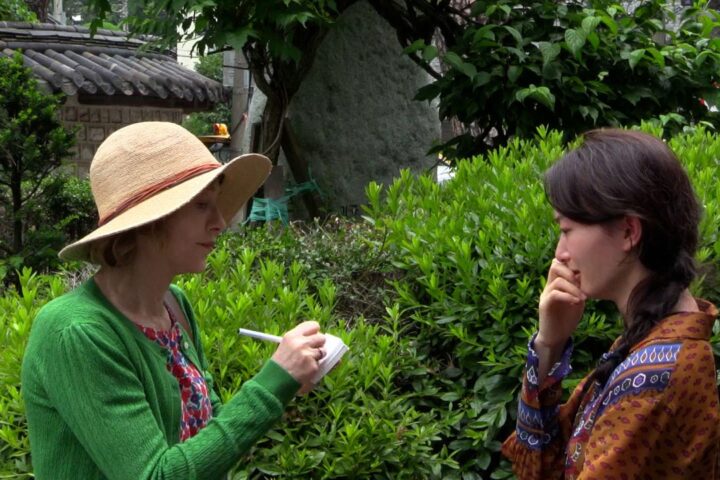Jia Zhang-ke’s Caught by the Tides attests to the fact that making art under the most adverse conditions can prove to be serendipitous. If shooting a film from scratch wasn’t feasible under China’s restrictive Covid lockdowns, Jia viewed the situation as a formal constraint, in the same way a poet might approach the rules of a sestina. Turning to his existing body of work, he recycled earlier material, editing together unused footage with what could be shot under the circumstances. The result is a bricolage of documentary, minimalist drama, and experimental remake. As Jia’s filmography is inseparable from the career of his spouse and longtime collaborator, actress Zhao Tao, the film also operates as a dual retrospective.
In execution, Jia doesn’t blend genres so homogenously as to obscure their distinctions. He prefers to shift the balance over the course of Caught by the Tides, allowing fictional elements to gradually emerge from a documentary substrate. Fortuitously, footage shot for one purpose or another over decades reflects the seismic shifts China has itself undergone. Though never overtly, Jia tracks the increasing influence of Western media, technology, and commercial enterprise as China’s economy becomes more openly capitalist. Not one but two club scenes ironically feature the orientalist Eurodance hit “Butterfly” by Smile.dk.
Meanwhile, the story evokes more than tells how lovers Qiao Qiao (Zhao), a dancer and model, and Guao Bin (Li Zhubin), a petty criminal and opportunist, drift apart. Though narrative displaces documentary as the footage catches up to the present day, it remains fragmentary, relying on gestures at Jia’s more explicitly narrative outings, like Still Life and Ash Is Purest White. After Bin leaves Qiao behind in Datong, in the northern Shanxi Province, to ride the economic boom precipitated by the construction of Three Gorges Dam, she travels south to Fengjie and wanders until she finds him. They separate and Qiao returns to Datong. Years later, at the height of the pandemic, Bin returns in an attempt to rekindle their relationship.
Caught by the Tides happily includes discordant sequences which would have been edited out of a more conventional film. A scene in which Qiao makes her way through a dilapidated mining town trying to evade a group of leering men, who circle her on their dirt bikes like vultures, is juxtaposed against an interlude in her apartment, where she swats at a fly, unsuccessfully but almost joyfully. In the scene before Bin leaves for Fengjie, Qiao, in tears, tries over and over to get off a disused bus, making it almost to the door before Bin pushes her back down onto one of the seats. The process is repeated to the point of tedium, but Zhao’s ability to embody alienation and naïveté, sometimes both at once, prevents the moment from crossing into absurdity.
Early in the film, a slow tracking shot captures a busy street in Datong, while a harmonica number by Chinese alt rockers Omnipotent Youth Society plays over the soundtrack. “That’s how my life has gone for 30 years,” Dong Yaqian sings, “until the whole edifice comes down.” With this pairing of music and footage, Jia turns a quotidian tableau into a time capsule. Distilling its transitory nature, he locates the eternal precisely in the ephemerality shared by every moment, no matter how banal it may have felt to those who experienced it.
Jia also finds a place for more startling experiments in editing. For a scene depicting a journey by train, he superimposes images of blurred landscape over freeze frames of the passengers, which recalls, in the tension created between movement and statis, Umberto Boccioni’s States of Mind II: Those Who Go. While it’s a through line in his work, Caught by the Tides unequivocally reveals Jia’s knack for capturing what is on the brink of vanishing under the crushing forces of history. The film is riddled with haunting interstices—architectural remnants of another time, liminal spaces, tenements and street corners that seem empty even when full of people.
With the film’s return to Fengjie, which served as a setting for both Still Life and Ash Is Purest White, the town’s significance to the themes and images that prevail in Jia’s cannon crystalizes. To make way for rising water levels in the reservoir zone behind the colossal Three Gorges Dam, the place is dismantled brick by brick, one blow of the sledge hammer at a time, as its inhabitants are forcibly relocated. In the looming shadow of progress and prosperity—for some—Qiao and Bin follow in the footsteps of Jia’s many estranged lovers and disaffected travelers.
Paradoxically, it’s at film’s end, in the most overtly alienating conditions of lockdown, with everyone masked, socially distanced, and tracked at every turn by the state, that glimpses of unalienated humanity shine through. Formally, Jia has created here an archival work that preserves and recontextualizes moments of transience and melancholy that might otherwise be engulfed by history. There would be a danger here in executing the endless reshuffling and repackaging function that’s become the province of AI, except that the story Jia tells through Qiao and Bin turns into a parable warning against nostalgic attempts to recreate the past.
Perhaps unavoidably, given that it never strays far from the path that Jia’s past work has charted, the film can feel as if wants for self-sufficiency. Caught by the Tides makes it a little too obvious, perhaps, that Jia’s films tend to retell what’s essentially the same story of alienated lovers, no matter how archetypal that story may to be, and there are moments when it approaches self-parody. But this self-citational quality is offset by the resonance of individual images that Jia has recovered from the dustbin of history. Given how the story ends in this iteration, perhaps we can expect Jia’s next film to be more of a departure than a return.
Since 2001, we've brought you uncompromising, candid takes on the world of film, music, television, video games, theater, and more. Independently owned and operated publications like Slant have been hit hard in recent years, but we’re committed to keeping our content free and accessible—meaning no paywalls or fees.
If you like what we do, please consider subscribing to our Patreon or making a donation.




